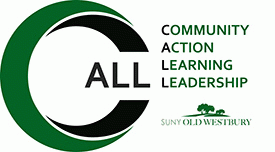
CALL is a partner for engaged and immersive experiences.
What is Service Learning?
Service-learning is a form of experiential learning that makes students active participants in their learning, taking them beyond the classroom as they develop civic knowledge and skills.
Benefits of CALL for Faculty
Engaging in service-learning enables faculty to:
- Expand and diversify teaching strategies, combining traditional instruction with hands on service learning, small group work, and reflective practices.
- Collaborate on integrated curriculum and assessment development.
- Enhance interactions with students.
- Deepen knowledge of research and theory in areas such as cultural sensitivity, civic engagement, and critical thinking.
- Engage in professional development, including research and presentations.
- Build stronger and meaningful connections with local organizations and integrate community insights into academic content which may lead to future opportunities for research, service, and student internships.
- Gain new perspectives on teaching through discussions and continuous assessment.
- Heighten awareness of community issues relevant to academic interests.
- Discover social and student trends to inform research.
- Foster interdisciplinary collaboration opportunities.
Empowering Faculty and Students through Service-Learning
The CALL program provides comprehensive support for faculty facilitating service-learning courses. By establishing partnerships with external community organization and initiatives, CALL fosters meaningful connections that enhance academic engagement.
